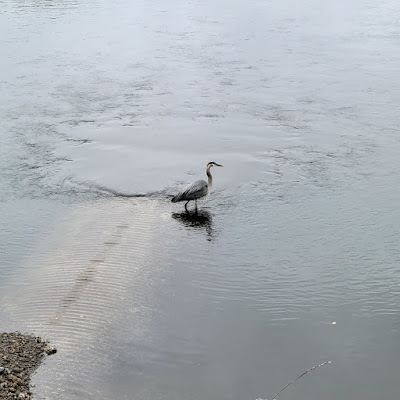Sporadically addressing good books, vegetarian/vegan food and cooking, equity and justice, public policy and a touch of politics, family, work, movies, words, life, coffee, chocolate, and social media in no particular order. More bikey blogging (also sporadic) at BikeStyleLife.com
Walking in June: Of Habits and Herons
Making Soup: A Pot Full of Poems
Soup makes for great literal descriptive poems and for those relying on its metaphors about ingredients and the act of preparation. Celebrating the way the ingredients come together to create flavors is irresistible; I too have been known to compare a completely different activity to the making of soup, like, say, a bike network.
I'm not the only one who has this impulse. Thanks to a recommendation in an online community I'm now reading Eat this Poem: A Literary Feast of Recipes Inspired by Poetry, by Nicole Gulotta. It's a delightful collection for people who, like me, love to cook and love to read poetry. She writes with an understanding of both literary analysis and simple, tasty cooking.This list isn't drawn from that book. It's drawn from my morning routine of reading poetry while I drink coffee—two ways of waking my brain up without asking too much of it first thing.
Sometimes the poem truly is about soup in all its deliciousness, sometimes the soup is a metaphor. I'm not reproducing entire poems here, simply a few lines to give you a taste.
"Abeyance" by Rebecca Foust
I made soup tonight, with cabbage, chard
and thyme picked outside our back door.
For this moment the room is warm and light,
and I can presume you safe somewhere.
"Self Help" by Bruce Covey
A chicken soup for the one who is eaten.
A chicken soup for the one who eats
Things other than chicken soup.
Transcending the bowl.
"A Pot of Red Lentils" by Peter Pereira
simmers on the kitchen stove.
All afternoon dense kernels
surrender to the fertile
juices, their tender bellies
swelling with delight.
"Trying to Name What Doesn't Change" by Naomi Shihab Nye
The widow in the tilted house
spices her soup with cinnamon.
Ask her what doesn’t change.
"Acceptance Speech" by Lynn Powell
And let me just add that I could not
have made it without the marrow bone, that blood—
brother to the broth, and the tomatoes
who opened up their hearts, and the self-effacing limas,
the blonde sorority of corn, the cayenne
and oregano who dashed in
in the nick of time.
"To Say Nothing but Thank You" by Jeanne Lohman
remember who I am, a woman learning to praise
something as small as dandelion petals floating on the
steaming surface of this bowl of vegetable soup,
my happy, savoring tongue.
"Monday" by Cindy Gregg
I am cutting carrots
for the chicken soup.
Knife against carrot
again and again
sends a plop of pennies
into the pan.
"My Mother Prepares Ofe Egusi" by Emily Igwike
a steaming pot of egusi fills my void
and the space in this quaint kitchen.
"Da Capo" by Jane Hirshfeld
Returning home, slice carrots, onions, celery.
Glaze them in oil before adding
the lentils, water, and herbs.
"Monday Night: A Portrait" by Rosemerry Wahtola Trommer
Even as she made the cauliflower soup,
she was a deep space explorer.
No one else in the room seemed to notice
she was floating. No one noticed
how gravity had no hold on her.
No, they only saw she was chopping onions,
Updated May 28, 2024 to add this next one
"Potato Soup" by Daniel Nyikos
I set up my computer and webcam in the kitchen
so I can ask my mother’s and aunt’s advice
as I cook soup for the first time alone.
My mother is in Utah. My aunt is in Hungary.
Related reading: Your suggestions invited
Have a favorite soup or cooking-related poem to share in the comments? Soup recipes welcome too!
Poetry round-ups over on my bikey/transportation blog and other soup-related posts:
- “I think/therefore/I ride.” A Bike Rack of Bicycle Poems
- “Safe passage through countless intersections”: A Baker’s Dozen of Transportation Poems
- “Do Not Drive Through, This Poem’s In The Way”: Transportation Poems Keep Rolling In
- Making Soup—Er, Bike Networks
- Not Exactly a Recipe for Potato Soup: My Vegetarian Trickery
- Recipe Time: Interpretation of a Kinda Chunky Tomato/Red Bell Pepper/Black Bean Soup
- Kate and the Tomato Soup Incident


